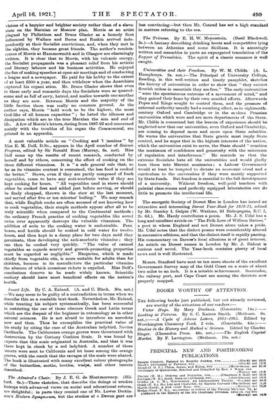Universities and their Freedom. By W. M. Childs. (A. L.
Humphreys. 2s. net.)—The Principal of University College, Reading, in this well-written and timely pamphlet, sketches the history of universities in order to show that " they cannot flourish unless in essentials they are free." The early universities " were the spontaneous outcome of a movement of mind," and they gained their fame by their own unaided efforts. Afterwards Popes and Kings sought to control them, and the pressure of external authority usually had a numbing effect, as in eighteenth- century Oxford and Cambridge or in the m3dern Prussian universities which were and are mere departments of the State. Mr. Childs is concerned lest the lessons of experience should be neglected now that our universities, even Oxford and Cambridge, are coming to depend more and more upon State subsidies. He warns the universities that State grants must imply State control, and he urges that in the highest interests of the nation, which the universities exist to serve, the State should " combine the maximum of confidence and generosity with the minimum of regulation and interference." He reminds us that the extreme Socialists hate all the universities and would gladly turn them into Marxist seminaries ; a Labour Government would at least be tempted to dictate an economic creed and a curriculum to the universities if they were mainly supported by State funds. But freedom is essential to the full development of a university. Without freedom, well-paid teachers with palatial class-rooms and perfectly equipped laboratories can do little to promote the intellectual life.


































 Previous page
Previous page